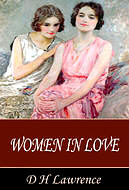|
 |
David Herbert Lawrence was an English
novelist, poet, playwright, essayist, literary critic and painter. His
collected works represent, among other things, an extended reflection
upon the dehumanising effects of modernity and industrialisation. Some
of the issues Lawrence explores are sexuality, emotional health,
vitality, spontaneity, and instinct. Lawrence's opinions earned him many
enemies and he endured official persecution, censorship, and
misrepresentation of his creative work throughout the second half of his
life, much of which he spent in a voluntary exile. At the time of his
death, his public reputation was that of a pornographer who had wasted
his considerable talents. E. M. Forster, in an obituary notice,
challenged this widely held view, describing him as "the greatest
imaginative novelist of our generation". |
|
|
Click
on the cover to download your book / Haz clic en la tapa
del libro para
descargarlo. |
|
 |
WOMEN IN LOVE
"Women in Love" is a sequel to his earlier novel "The Rainbow" (1915),
and follows the continuing loves and lives of the Brangwen sisters,
Gudrun and Ursula. Gudrun Brangwen, an artist, pursues a destructive
relationship with Gerald Crich, an industrialist. Lawrence contrasts
this pair with the love that develops between Ursula Brangwen and Rupert
Birkin, an alienated intellectual who articulates many opinions
associated with the author. The emotional relationships thus established
are given further depth and tension by an intense psychological and
physical attraction between Gerald and Rupert. The novel ranges over the
whole of British society before the time of the First World War and
eventually concludes in the snows of the Tyrolean Alps. |
|
|
|
 |
SONS AND LOVERS
While
this novel initially received a lukewarm critical reception, along with
allegations of obscenity, it is today regarded as a masterpiece by many
critics and is often regarded as Lawrence's finest achievement.
Lawrence began working on the novel in the period of his mother's
illness, and often expresses this sense of his mother's wasted life
through his female protagonist Gertrude Morel. Letters written around
the time of its development clearly demonstrate the admiration he felt
for his mother and her apparently unfortunate marriage to his coal-miner
father, a man of 'sanguine temperament' and instability. He believed
that his mother had married below her class status. Lydia Lawrence
wasn't born into the middle-class. |
|
|
|
All
contents is for educational and informational use only. All books remain the right of the original copyright holder, and no infringment is
here intended / Todo
el contenido es pura y exclusivamente para uso educativo e informativo. Todos
los libros continúan permaneciendo al poseedor original de los derechos autorales, no existiendo aquí intención alguna de infringir la ley. |
|